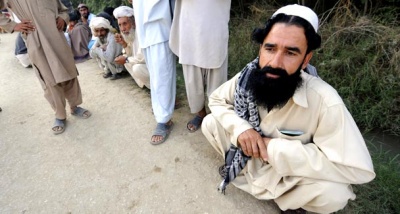A Rebab smashed: Difference between revisions
Allenwalla (talk | contribs) mNo edit summary |
Allenwalla (talk | contribs) m (moved Rebab to A Rebab smashed) |
(No difference)
| |
Revision as of 02:53, 23 October 2009
Guru Nanak accompanied by his childhood friend, a Muslim named Mardana who played the Rebab while Nanak sang…
And so in the very lands where Guru Nanak Dev may have walked on his 'journeys', music and song- has been dying a sudden and violent death.
This is a tale of a modern Rebab player who has not been allowed to sing in praise of God (Allah) for many years.. The man who shows his face and speaks out on the death of music desired for all of Pakistan, even the world, if the taleban had their way. With Brigadiers being killed by pillion riding bikers and women being blown up in their cafeteria at an Islamic College - he is a very brave man indeed.
Waziristan musician prays for Taliban defeat File:Akbar b 325.jpg
A Story appearing in Dawn News,com - Friday, 23 Oct, 2009
‘I recite from the Holy Koran every morning and pray for the success of the military operation and when they are defeated I will buy another rubab’: musician Mohammad Akbar, pictured here sitting in queue to register with authorities in Dera Ismail Khan
DERA ISMAIL KHAN: Mohammad Akbar says he prays every day for the Pakistani army to crush the Taliban so he can make sweet music once more without fearing for his life.
‘They smashed it into pieces and warned me of serious consequences if I ever played it again,’ said Akbar as he recalled the day two years ago that the Islamists forced him to give a recital of his rubab — a traditional lute-like instrument that is popular in Pakistan and Afghanistan.
‘I recite from the Holy Koran every morning and pray for the success of the military operation and when they are defeated I will buy another rubab,’ he said.
The 39-year-old was speaking in the dusty town of Dera Ismail Khan where he fled with his wife and seven children to escape a major offensive by the army against the Tehrik-i-Taliban in neighbouring South Waziristan.
While those living in Pakistan’s semi-autonomous tribal belt are fiercely protective of their independence from the federal government, the Islamist militants have alienated many with their hardline edicts, such as a ban on music.
‘The Taliban cannot be our friends,’ said Akbar, as he recalls incidents of flogging and beheading of those who fell foul of the extremists.
Akbar looked visibly distressed as he spoke about his ordeal which started two years ago when a Taliban delegation turned up at his home, following a tip-off from one of his neighbours.
Not knowing they were from the Taliban, he served them tea, played his rubab and sang for them in his living room.
And then they grabbed the instrument and smashed it.
‘It was a warning from them. I was forced to stop playing an instrument that I started playing in 1981,’ he said.
Islamic extremists have blown up hundreds of music and DVD shops in the troubled North West Frontier Province (NWFP), calling the practices against the tenets of Islam.
Shop owners were forced to display the pro-Taliban material which ranged from tirades against the United States to gruesome clips of beheadings and bomb attacks.
Tears rolled down Akbar’s cheeks as he talked about one of his very close friends Ahmad Shah, whom he says was executed by Taliban for playing the flute.
‘They slit his throat because he ignored their warning,’ said Akbar.
The musician also recalled his childhood friendship with Qari Hussain, a reputed mass trainer of suicide bombers whose home town is now surrounded by the army, saying that Hussain also did not like his hobby of playing the rubab.
When he confronted Hussain, who returned to South Waziristan in 2007 after living for years in Karachi, about the Taliban’s behaviour, he received an icy reply.
‘I went to him to lodge complaint but he asked me to be thankful to God that they did not kill me on his request,’ he said.
Akbar is one of the recipients of an official allowance of 5,000 Pakistani rupees (60 dollars) the government is giving to each family displaced by the fighting in South Waziristan.
‘It means I can now afford to buy another rebab,’ he said. —AFP

